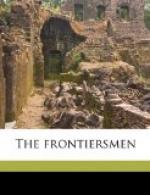The sport was very keen, the contest being exceedingly close, for Wyejah had long needed only one additional point to make him a winner, and when Otasite had failed to score he had also failed. The swift motion, the graceful agility, the smiling face of Otasite,—for it was a matter of the extremest exaction in the Indian games that however strenuous the exertion and tense the strain upon the nerves and grievous the mischances of the sport, the utmost placidity of manner and temper must be preserved throughout,—all appealed freshly to the trader, although it was a long-accustomed sight.
“Many a man in Charlestown—a well-to-do man” (applying the commercial standard of value)—“would be proud to have such a son,” he muttered, a trifle dismayed by the perverse incongruities of fate. “He would have sent the boy to school. If there was money enough he would have sent him to England to be educated—and none too good for him!”
The shadows of the two players, all foreshortened by the approach of noontide, bobbed about in dwarfish caricature along the smooth sandy stretch. The great chungke-pole, an obelisk forty feet high planted on a low mound in the centre of the chungke-yard, and with a target at its summit used for trials of skill in marksmanship, cast a diminished simulacrum on the ground at its base scarcely larger than the chungke-lances. Now and again these heavy projectiles flew through the air, impelled with an incredible force and a skill so accurate that it seemed impossible that both contestants should not excel. There was a moment, however, when Otasite might have made the decisive point to score eleven had not the chungke-stone slipped from the hand of Wyejah as he cast it, falling only a few yards distant. Otasite’s lance, flung instantly, shot far beyond that missile, for which, had the stone been properly thrown, he should have aimed. Wyejah, disconcerted and shaken by the mischance, launching his lance at haphazard, almost mechanically, struck by obvious accident the flying lance of his adversary, deflecting its course—the decisive cast, for which he had striven so long in vain, and which was now merely fortuitous.
The crowds of Indian gamblers, with much money and goods at hazard upon the event, some, indeed, having staked the clothes upon their backs, the rifles and powder for their winter hunt that should furnish them with food, were at once in a clamor of discussion as to the fair adjustment of the throw in the score. The backers of Wyejah claimed the accidental hit as genuine and closing the game. The backers of Otasite protested that it could not be thus held, since Wyejah’s defective cast of the chungke-stone debarred their champion from the possibility of first scoring the eleventh point, which chance was his by right, it being his turn to play; they met the argument caviling at Otasite’s lack of aim by the counter-argument that one does not aim at a moving object where it is at the moment, but with an intuitive calculation of distance and speed where it will be when reached by the projectile hurled after it, illustrating cleverly by the example of shooting with bow and arrow at a bird on the wing.




